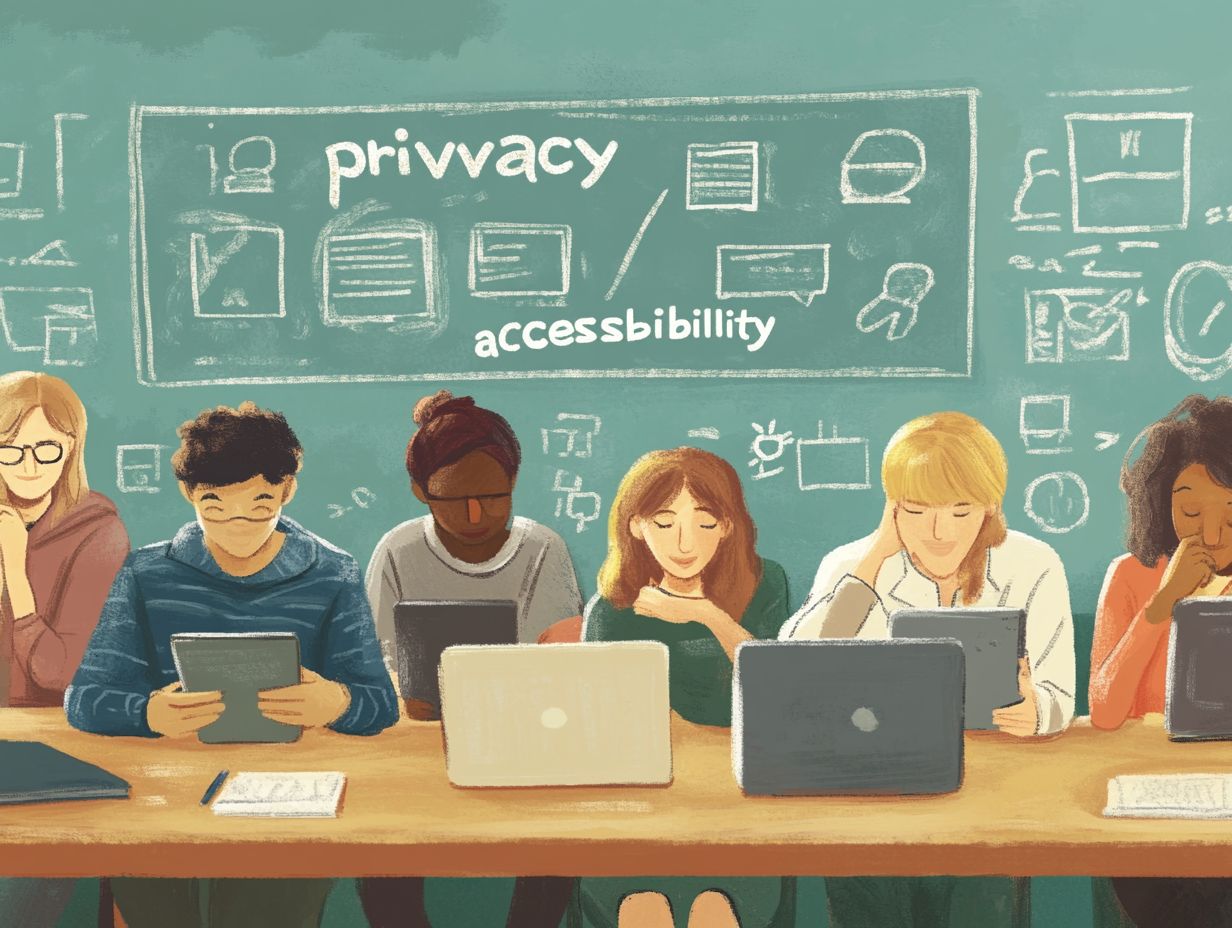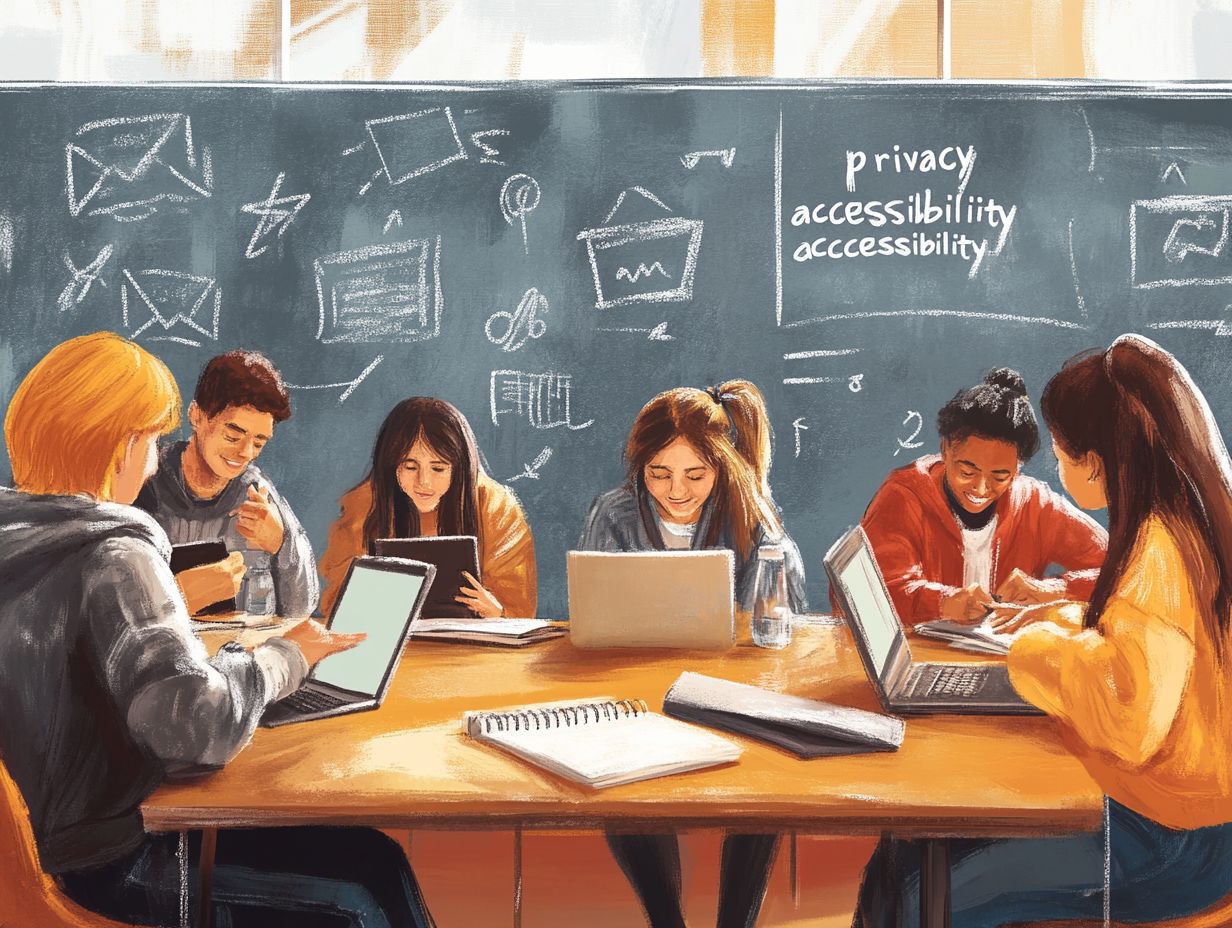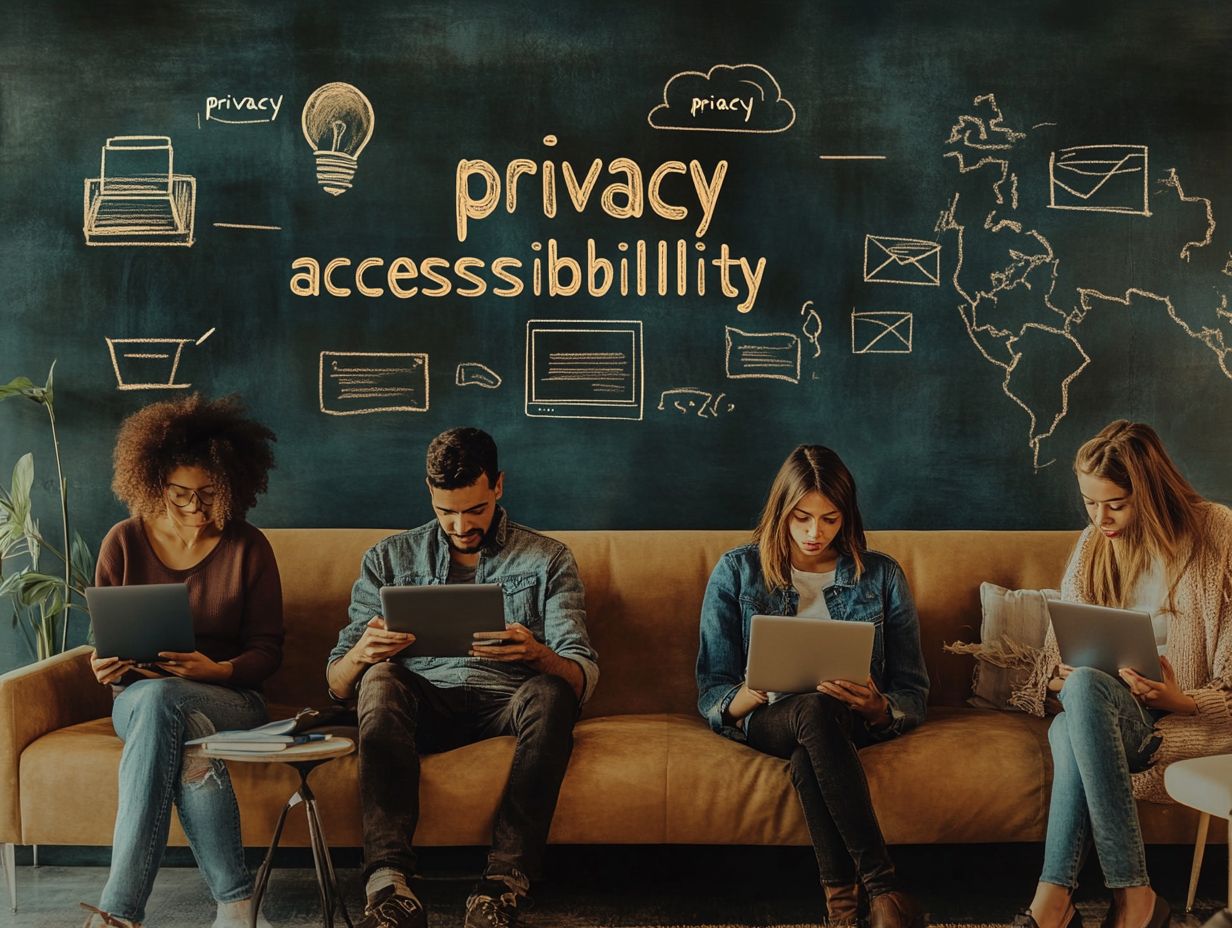What Are the Ethical Considerations in Online Learning?
In today s digital age, online learning has transformed education, creating remarkable opportunities worldwide. This change brings a need to examine the ethical considerations affecting educators and learners.
Safeguarding academic integrity and protecting student privacy are critical. This discussion delves into the significance of these considerations and highlights common ethical challenges.
Join us in exploring how ethics is revolutionizing the future of education.
Contents
Key Takeaways:

Online learning must prioritize ethical considerations to ensure fairness and integrity for all participants.
Plagiarism, privacy, and accessibility are essential ethical issues in online learning.
Strategies, tools, and technologies can promote ethical behavior and prevent ethical issues.
Ethical Considerations in Online Learning
Ethical considerations in online learning are crucial as educational technologies advance. Remote teaching introduces various ethical concerns that educators and students must navigate thoughtfully.
From dilemmas about academic integrity to issues of surveillance and privacy, online instruction poses many challenges. These demand careful attention and proactive strategies.
The role of technology is significant in shaping these ethical discussions. Understanding ethical issues across online platforms is necessary.
The Importance of Ethical Considerations in Online Learning
Ethical considerations serve as the foundation for academic integrity and equitable experiences for students. As online learning platforms increase, ethical behavior is a pressing concern.
Issues like cheating, academic dishonesty, and digital inequalities need attention. Educators must cultivate a fair and inclusive environment, even amid resource limitations.
Ethical Issues in Online Learning

Ethical issues in online learning present challenges for educators and students. Academic dishonesty, plagiarism, privacy, and data protection threaten the integrity of the learning experience.
Ensuring accessibility and inclusivity is vital. Neglecting these aspects can marginalize specific student groups, widening the digital divide in education.
Plagiarism and Academic Integrity
Plagiarism and academic integrity are important ethical issues that challenge the foundation of online learning environments. These issues can lead to serious consequences for both students and institutions.
The ease of accessing information online can tempt students into academic dishonesty. Therefore, educators must cultivate a culture that promotes ethical behavior and accountability.
By implementing strategies that deter cheating and encourage academic integrity, you can help create an environment that values original thought and responsible scholarship. Developing a strong understanding of the relationship between plagiarism and academic integrity is essential for your success.
Preventive measures, such as comprehensive honor codes and resources on proper citation practices, empower you to navigate academic expectations with confidence.
The distinct roles of monitored exams those watched by a teacher and unmonitored ones play a significant part in this discussion. Monitored exams provide a structured setting that reduces the likelihood of cheating, while unmonitored exams require greater trust and self-regulation from you as a student.
As technology reshapes the conversation around academic honesty, tools like plagiarism detection software not only deter dishonesty but also educate you on the importance of originality in your work. This also reinforces a culture of integrity within online education, benefiting you and your peers.
Privacy and Data Protection
Privacy and data protection are crucial ethical considerations in online learning that you must address as you use various digital platforms. With increasing surveillance and monitoring technologies, your privacy may be at risk.
Tackling these issues is vital not only to safeguard your rights but also to build trust between you and your educators in this digital landscape.
As data analytics become more integrated into educational practices, questions about consent and the intent behind data collection arise. Institutions should adhere to regulations and embrace ethical frameworks that prioritize the protection of personal information.
You have the right to expect that any data collected will be used solely to enhance your learning experience, not for intrusive monitoring.
By fostering transparent policies and involving you in discussions about your privacy rights, educators can create a collaborative atmosphere that respects your autonomy while effectively using technology.
Accessibility and Inclusivity

Accessibility and inclusivity are fundamental ethical considerations in online learning that directly impact your ability to engage equally in educational opportunities.
Digital inequalities can create barriers to essential resources, leading to significant disparities in learning experiences and outcomes.
It s vital to ensure that you have equal access to online learning platforms and resources, addressing ethical concerns related to discrimination and bias. This challenge is especially pressing for students from marginalized backgrounds who may lack reliable internet access or appropriate devices.
Implementing universal design principles in course materials ensures that content is available in various formats, catering to your diverse learning needs.
Using assistive technologies and offering flexible learning schedules can significantly enhance your engagement.
Institutions can also promote collaboration by fostering a sense of community through peer mentoring and open forums. This ultimately nurtures a culture of support and understanding that is crucial for your success.
Addressing Ethical Issues in Online Learning
Addressing ethical issues in online learning requires the careful implementation of effective strategies that promote ethical behavior among both students and educators.
Since academic integrity serves as a cornerstone of quality education, institutions must take action against academic dishonesty and create an environment that values accountability and ethical decision-making.
When used thoughtfully, innovative monitoring technologies can be invaluable assets in this mission. They equip educators with tools to deter unethical practices while safeguarding the integrity of the online learning experience.
Now is the time to take a stand for your rights and wellbeing in online learning environments.
Strategies for Promoting Ethical Behavior
Promoting ethical behavior in online learning is essential for building a culture of integrity and accountability among students.
Taking active steps, like clearly communicating expectations and fostering community engagement, guides students toward responsible decision-making. This is crucial in remote teaching, where unique challenges may arise.
Incorporating tools like plagiarism detection software, which are tools that check for copied work, discourages dishonest practices and teaches students about proper citation methods.
Creating engaging virtual discussions about ethics helps students understand the importance of honesty in their work. Using case studies that showcase real-life instances of cheating reminds students of the consequences of unethical behavior.
For instance, a university introduced weekly integrity workshops that significantly reduced cheating. This shows that ongoing engagement can build trust within online learning communities.
Tools and Technologies for Monitoring and Preventing Ethical Issues

Tools and technologies designed for monitoring and preventing ethical issues in online learning are essential for upholding academic integrity and ensuring a fair educational experience.
Proctored exams and advanced surveillance solutions enable you, as an educator, to oversee student assessments, effectively deterring any attempt at academic dishonesty. However, implementing such technologies requires a careful balance; it’s crucial to maintain oversight while also preserving your students’ privacy and trust within the online learning environment.
Learning management systems (LMS) often come with analytics that track student engagement and performance, helping you identify at-risk students early on. Applications leveraging artificial intelligence (AI) can detect patterns indicative of cheating, providing real-time insights for you to act upon.
While these innovations certainly bolster your monitoring capabilities, they may also raise valid concerns about data integrity and potential biases in AI algorithms. Therefore, it s imperative for educational institutions to adopt a transparent approach, ensuring students are well-informed about how their data is being utilized. This transparency can significantly enhance trust and cooperation within the online learning community.
The Role of Ethics in Shaping the Future of Online Learning
The role of ethics in shaping the future of online learning is becoming increasingly significant as you navigate the complexities of technology integration and its implications for curriculum and instruction.
As you embrace digital platforms, maintaining academic integrity is paramount. This influences the development of transparent guidelines that effectively tackle issues like plagiarism and assessment fairness.
Ethical frameworks are essential in creating inclusive practices that provide all learners, regardless of their background, with equal opportunities to thrive in a virtual environment.
With advancements in technologies such as AI and analytics, new challenges and responsibilities arise that you must adeptly address.
By prioritizing ethical considerations, you can help cultivate an educational landscape that not only enhances learning outcomes but also fosters a sense of community and respect among diverse student populations.
Start fostering ethical behavior in your online classrooms today!
Final Thoughts and Recommendations
Navigating ethical concerns in online learning is essential. Educators and institutions must prioritize academic integrity while teaching remotely.
Think about how digital resources can help or hurt learning. Establish clear policies for plagiarism, cheating, and unauthorized collaboration to maintain a fair environment.
Fostering a space that values diverse perspectives enriches the learning experience. It ensures every student feels respected and valued.
Your commitment to ongoing professional development will help you adapt and innovate in your teaching.
Building a community to share best practices and encourage ethical decision-making enhances the learning experience and boosts student outcomes.
To drive change, institutions should hold regular workshops on ethics. Engage students in discussions about integrity and develop resources for best practices in online education.






